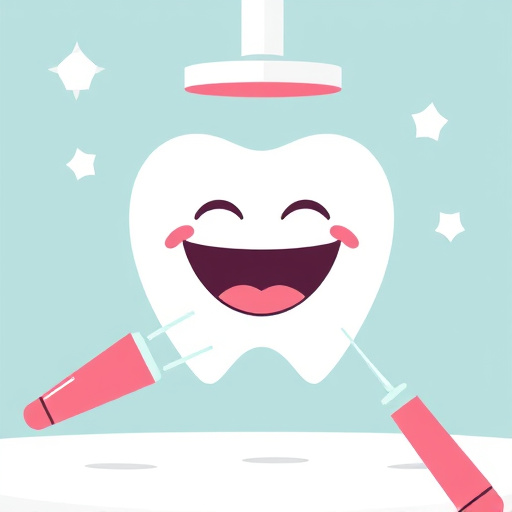Snoring, caused by blocked breathing and relaxed throat muscles, impacts physical and mental health. Effective snoring treatment options address underlying causes like genetics, aging, weight gain, or medical conditions like sleep apnea. These range from decongestants and dental procedures to advanced sleep devices. Regular oral exams help manage exacerbating factors. Modern dentistry offers tailored solutions, including routine check-ups, cosmetic fillings, and clear aligners, for improved sleep quality and overall well-being. Addressing dental issues through cleanings and wisdom tooth removal significantly reduces snoring caused by blocked airways. Maintaining strong oral hygiene practices enhances throat and respiratory health, targeting chronic snoring holistically.
Snoring affects millions, disrupting sleep quality and relationships. Fortunately, personalized snoring treatment options offer long-term relief. This comprehensive guide delves into understanding snoring’s causes and impact, exploring tailored solutions like oral appliances, nasal strips, and advanced therapies. Learn how to silence your snores for good and reclaim restful nights with our expert-backed strategies. Discover the best snoring treatment options for your unique needs today.
- Understanding Snoring: Causes and Impact
- Exploring Personalized Treatment Options
- Long-Term Relief Strategies for Chronic Snorers
Understanding Snoring: Causes and Impact

Snoring is a common sleep disorder that occurs when the respiratory system is obstructed during breathing, leading to vibrations in the throat and nasal passages. These vibrations create the characteristic snorting sound. While it may seem like a harmless habit, chronic snoring can have significant impacts on both physical and mental health. The primary cause of snoring is the relaxation of muscles in the throat, which can be attributed to various factors such as genetics, aging, excess weight, or certain medical conditions like sleep apnea.
Understanding the causes of snoring is crucial for selecting appropriate snoring treatment options. For instance, if a person’s snoring is due to blocked nasal passages, decongestants or nasal strips might offer relief. In cases where wisdom tooth removal or addressing dental issues like gum disease or misaligned jaws are contributing factors, these procedures can alleviate snoring. Even routine oral exams can help identify and treat underlying conditions that exacerbate snoring. For severe cases, more advanced treatments such as dental crowns or specialized devices worn during sleep may be recommended to maintain open airways.
Exploring Personalized Treatment Options

In the quest for long-term relief from snoring, exploring personalized treatment options is a game-changer. Snoring isn’t just a nuisance; it can disrupt sleep quality and lead to various health issues over time. Recognizing this, modern dentistry offers a range of tailored solutions that extend far beyond traditional remedies. By factoring in individual needs, lifestyle, and severity of snoring, patients can access innovative approaches like routine oral exams to monitor progress, cosmetic fillings for subtle yet effective adjustments, or clear aligners that discreetly address the root causes.
These personalized snoring treatment options represent a significant advancement in sleep medicine. While some may opt for conventional methods, many are discovering the benefits of customized care. Incorporating regular check-ups, advanced restorative techniques like cosmetic fillings, and innovative orthodontic solutions such as clear aligners allows for a holistic approach to snoring management. This ensures not just short-term relief but also long-lasting improvements in sleep quality and overall well-being.
Long-Term Relief Strategies for Chronic Snorers

For those who experience chronic snoring, finding long-term relief is essential for both personal comfort and overall health. Beyond standard remedies like elevating the head or using nasal strips, there are several snoring treatment options that can offer sustainable solutions. One effective strategy involves addressing underlying dental issues. Regular dental cleanings and checking for wisdom tooth removal candidates can significantly reduce snoring caused by blocked airways.
Additionally, focusing on oral hygiene practices, including thorough teeth cleaning, has been shown to minimize inflammation in the throat and upper respiratory tract, which is a common contributor to chronic snoring. These holistic approaches not only aim to curb snoring but also promote better sleep quality and overall well-being.
Snoring can significantly impact quality of life, but understanding personalized snoring treatment options offers hope for long-term relief. By addressing the root causes and adopting tailored strategies, chronic snorers can find effective solutions to restore peaceful sleep and overall well-being. Exploring these diverse treatment options is a crucial step towards reclaiming a quieter, deeper rest.














